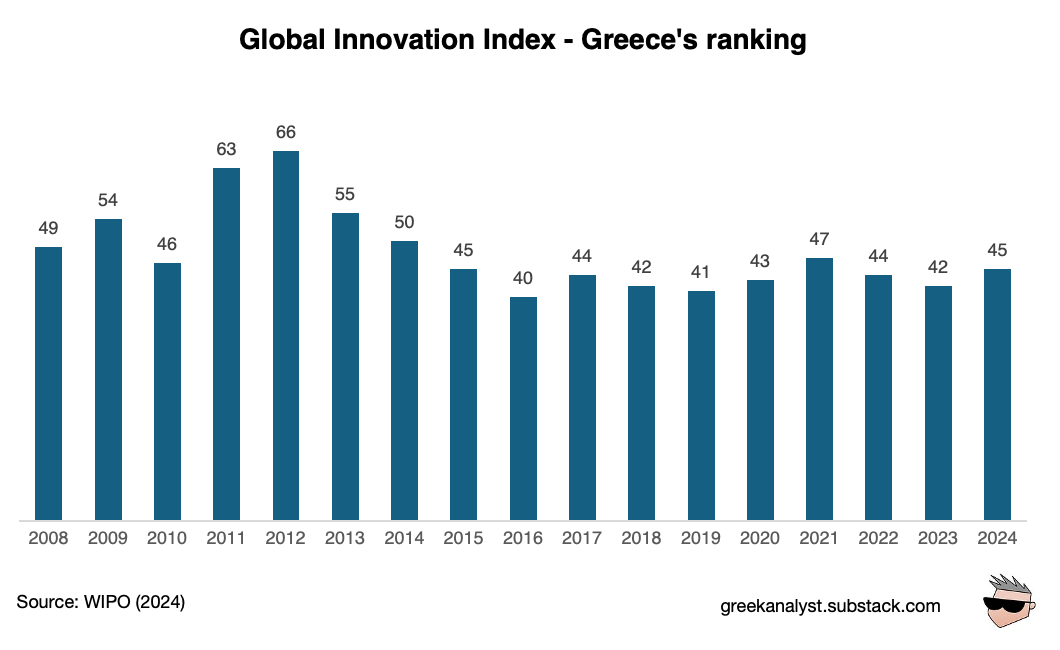Welcome to the awesome new readerswho joined us in the past week!
If you haven’t subscribed, join smart, curious people interested in .
Greece ranks 45th among 133 countries in the Global Innovation Index (GII) for 2024.
Greece’s innovation ranking has not really improved over the past decade.
One key part of innovation is the development of Intellectual Property (IP).
This is what I want to talk about today.
Greece has a long history of inventing things.
You should not be surprised to learn that Greeks might have invented the concept of IP protection as well.
One of the first known references to intellectual property protection dates from 500 B.C.E., when chefs in the Greek colony of Sybaris were granted year-long monopolies for creating particular culinary delights. (Stanford Encyclopedia of Philosophy)
Yes, you read that right.
How awesome is that!?
Since then, a lot has happened.
About a century ago (in 1920), Greece first implemented a system to protect industrial property and inventions. You can find some of these early patents here.

About half a century ago (in 1976), Greece officially joined the World Intellectual Property Organization (WIPO). WIPO is the international authority responsible for promoting and safeguarding IP rights across the world.
There are two main national IP offices in Greece:
IP law is complex locally but also globally. Greece has been closely following international mandates, harmonizing its IP legislation to comply with both common EU regulations and WIPO rules.
The Greek government recently created a simple yet helpful page to help people register trademarks, patents and designs.
How long are IP protections valid in Greece for? Well, it depends on the type:
But it is not just industrial IP and scientific breakthroughs that need to be safeguarded. IP protection also extends to the creative space.
Works of authorship (e.g. any original creative work such as a literary piece, musical composition, artistic creation) is protected by copyright upon its creation. There is no need for a filling or other registration
In Greece, a work of authorship is protected by copyright upon its creation, without the need for a filing or other registration formality. Despite the lack of registration or filing requirements, the Hellenic Copyright Organisation (HCO) introduced a timestamp digital service (available at www.timestamp.gr) in 2019, which enables authors to certify the date of creation of their work. The copyrighted work is recorded on an online platform operated by the HCO against payment of a symbolic monetary amount, which depends on the size of the file uploaded. (Year in review: IP in Greece, by Bernitsas Law @ Lexology)
That’s pretty awesome if you ask me.
According to the International IP Index 2025, Greece’s overall Index score has increased from 35.71 in the last edition to 38.46 this year.
Greece ranks 11th in Europe & Central Asia, slightly below the regional average.
One of the main reasons for the recent increase seems to be improved incentives for cutting-edge innovation, which is a very welcome piece of news.
In 2023, Greece ranks:
A detailed breakdown of Greece’s IP statistics by WIPO can be found here and here.
There are many reasons why Greece should care about (and invest in) higher IP creation and enforcement. Four areas are highly correlated with successful IP policy:
These all can be combined together under one theme: building and nurturing a successful Science & Technology (S&T) ecosystem.
While there is a lot of innovation density in Greece, the country has yet to become a Top 100 S&T cluster according to WIPO.
Not all hope is lost. Greece is systematically trying to grow its innovation footprint in recent years and slowly taking IP more seriously. Interestingly, the International IP Enforcement Summit 2025 will take place in Athens this year.
Could that be a sign of better things to come for the country?
Greece formally requests EU exemption for 2026 defense spending boost
LSE-HO hosted event regarding Greece’s growth drivers and challenges
Robeco highlights Greece as a key emerging market to watch
Brain drain/regain — life stories of Greek mobility
Greece’s VAT tax — a short introduction to the “beloved” local Greek tax
Greek pharma idustry by the numbers — an overview by Intellectica
Diofanti is a Metabase dashboard making access to Diavgia data easier
Genesis Ventures was one of Europe’s 5 most active VCs in Q1 2025
Astrato raises $5M seed-round to build AI-native self-service BI for cloud data
Coffeeco Upcycle raises €715K to turn coffee waste into skincare and bioplastics
AuraSkin selected in Amazon’s Sustainability Accelerator 2025 cohort
StrictlyVC to host event with Mitsotakis and tech celebs in Athens
AI startups with Greek ‘DNA’ are attracting huge sums of VC funding
Grant funding vs VC raising from the POV of a bootstrapper
Hellenic Institute of Advanced Studies is building bridges between Greece and the world's top universities with the Nicholas and Robert Askounis Ashford scholarship
Hellenic Foundation for Books and Culture (HFBC) was founded in 2024 with the aim of promoting Greek literature in Greece and abroad
Ioannis Antonoglou is a Greek super-mind building AI super intelligence systems
Loulis Mills has 243 years of history in Greece’s flour industry.
7 generations have managed this multi-centennial Greek business, which originally started with one small mill back in 1782 at Turkish-occupied Aetorahi of Ioannina.
Today, the Greek flour maker offers more than 320 flour products, has been included in the Greek stock market, boasts two state-of-the-art production units in Sourpi and Keratsini (with a private pier at the largest commercial port in Greece) and is exporting to dozens of countries abroad.
If you are eating a flour-based product anywhere in the country, chances are its basis has been created at Loulis Mills.
Who thought flour could be this exciting and durable?
That’s it for today. If you enjoyed today’s newsletter, please let me know with a like or reply. And if you value my content each week, consider pledging your support. Thanks!
















